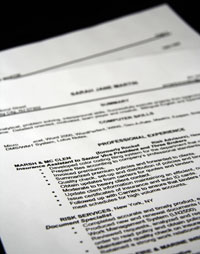 In this series of blog posts about recovering from major mess-ups during a job interview, we shed some light on how to recognize the gaffe and apologize where those giving the interview will respect your upfront acknowledgement of the mistake and respect your desire to learn from it. Then, we addressed the importance of staying calm and professional instead of dwelling on mistakes that will distract you and keep you from presenting the best possible you. The final ingredient in the recipe of interview recovery is to move on.
In this series of blog posts about recovering from major mess-ups during a job interview, we shed some light on how to recognize the gaffe and apologize where those giving the interview will respect your upfront acknowledgement of the mistake and respect your desire to learn from it. Then, we addressed the importance of staying calm and professional instead of dwelling on mistakes that will distract you and keep you from presenting the best possible you. The final ingredient in the recipe of interview recovery is to move on.
Move on
Sometimes it’s all you can do. Moving on doesn’t mean to give up, it just means to get past it and get on with the interview. If you waste time in the interview dwelling on your errors, the interviewer may too. Sometimes, the worst feeling from a mistake is realizing the mistake after you’ve gotten home from the interview. If you really feel like you’ve made a grave error after an interview, and think it needs to be addressed, put it in the thank-you card and send it that night. It’s still important to stay positive and let the interviewer regret your mistake. Even when the interview is over and you’re home it’s important to stay calm. Don’t mention the experience on your Facebook or Twitter. If you’re asked, be polite and professional when discussing a potential employer.
Prepare
Above all, the most important lesson to learn from your mistake is to always be prepared. This is the best way to avoid any sort of embarrassing blunders and mistakes. If you have any doubts such as name spelling or pronunciation, location, and other details, take a dip in your ego and call the interviewer for the information you need. It’s better to be cautious than make easily preventable mistakes.
It’s also important to keep in mind that sometimes it’s not a mistake at all. Interviews are tools meant for both parties. It’s just as much your chance to gage and analyze the employer as it is theirs. You may not have made any mistakes, but you feel like something isn’t right. It may just mean that the opportunity isn’t the right fit for you, and there may be something better for you in the future.
No matter how much you prepare, sometimes mistakes happen. If you apologize, and keep going in a professional manner, the interview doesn’t have to be a failure.





